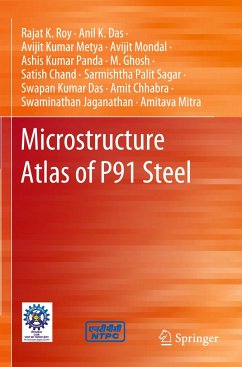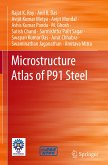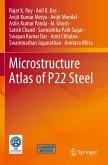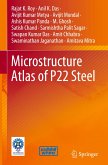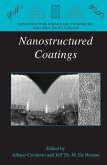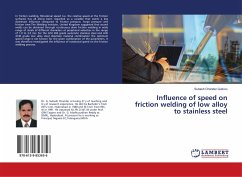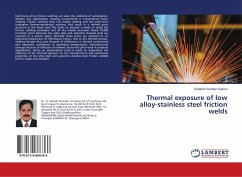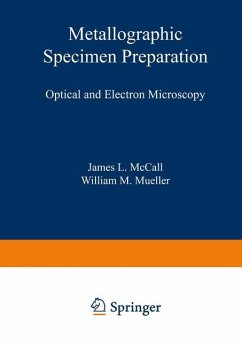- Broschiertes Buch
- Merkliste
- Auf die Merkliste
- Bewerten Bewerten
- Teilen
- Produkt teilen
- Produkterinnerung
- Produkterinnerung
This book highlights the qualitative and quantitative sequential changes in microstructure of P91 steel under various stress and temperature conditions. The P91 alloy is an established material used under elevated temperature and stress in the components of thermal power plants. Temperature and stress levels for laboratory experimentation have been selected based on the true operating condition of a boiler. This book describes both full length as well as interrupted tests that were performed under given parameters. Subsequently, the microstructures, bulk hardness and NDE parameters (magnetic…mehr
Andere Kunden interessierten sich auch für
![Microstructure Atlas of P91 Steel Microstructure Atlas of P91 Steel]() Rajat K. RoyMicrostructure Atlas of P91 Steel104,99 €
Rajat K. RoyMicrostructure Atlas of P91 Steel104,99 €![Microstructure Atlas of P22 Steel Microstructure Atlas of P22 Steel]() Rajat K. RoyMicrostructure Atlas of P22 Steel104,99 €
Rajat K. RoyMicrostructure Atlas of P22 Steel104,99 €![Microstructure Atlas of P22 Steel Microstructure Atlas of P22 Steel]() Rajat K. RoyMicrostructure Atlas of P22 Steel104,99 €
Rajat K. RoyMicrostructure Atlas of P22 Steel104,99 €![Nanostructured Coatings Nanostructured Coatings]() Nanostructured Coatings112,99 €
Nanostructured Coatings112,99 €![Influence of speed on friction welding of low alloy to stainless steel Influence of speed on friction welding of low alloy to stainless steel]() Subash Chander GuduruInfluence of speed on friction welding of low alloy to stainless steel24,99 €
Subash Chander GuduruInfluence of speed on friction welding of low alloy to stainless steel24,99 €![Thermal exposure of low alloy-stainless steel friction welds Thermal exposure of low alloy-stainless steel friction welds]() Subash Chander GuduruThermal exposure of low alloy-stainless steel friction welds26,99 €
Subash Chander GuduruThermal exposure of low alloy-stainless steel friction welds26,99 €![Metallographic Specimen Preparation Metallographic Specimen Preparation]() Metallographic Specimen Preparation77,99 €
Metallographic Specimen Preparation77,99 €-
-
-
This book highlights the qualitative and quantitative sequential changes in microstructure of P91 steel under various stress and temperature conditions. The P91 alloy is an established material used under elevated temperature and stress in the components of thermal power plants. Temperature and stress levels for laboratory experimentation have been selected based on the true operating condition of a boiler. This book describes both full length as well as interrupted tests that were performed under given parameters. Subsequently, the microstructures, bulk hardness and NDE parameters (magnetic and non-linear ultrasonic) have been evaluated. For reliable data, the microstructures have been observed at different regions of creep exposed samples by different characterization techniques. This has been further followed by drawing co-relation between specific features like precipitate size variation with creep strain / creep time and so on. Given the contents, this book will be a useful reference for researchers and professionals working in the area of materials especially in thermal power plants.
Produktdetails
- Produktdetails
- Verlag: Springer / Springer Nature Singapore / Springer, Berlin
- Artikelnr. des Verlages: 978-981-19-9564-4
- 2023
- Seitenzahl: 124
- Erscheinungstermin: 28. April 2024
- Englisch
- Abmessung: 235mm x 155mm x 8mm
- Gewicht: 201g
- ISBN-13: 9789811995644
- ISBN-10: 9811995648
- Artikelnr.: 70517884
- Herstellerkennzeichnung
- Springer-Verlag GmbH
- Tiergartenstr. 17
- 69121 Heidelberg
- ProductSafety@springernature.com
- Verlag: Springer / Springer Nature Singapore / Springer, Berlin
- Artikelnr. des Verlages: 978-981-19-9564-4
- 2023
- Seitenzahl: 124
- Erscheinungstermin: 28. April 2024
- Englisch
- Abmessung: 235mm x 155mm x 8mm
- Gewicht: 201g
- ISBN-13: 9789811995644
- ISBN-10: 9811995648
- Artikelnr.: 70517884
- Herstellerkennzeichnung
- Springer-Verlag GmbH
- Tiergartenstr. 17
- 69121 Heidelberg
- ProductSafety@springernature.com
Dr. Rajat K. Roy is currently positioned as a Senior Principal Scientist at CSIRNational Metallurgical Laboratory, Jamshedpur (India). After completing his Bachelor of Engineering and Master of Engineering in Metallurgy from Bengal Engineering College, Shibpur, Howrah (India), he obtained his Ph.D. degree in Metallurgical and Materials Engineering from Indian Institute of Technology, Kharagpur (India). His research areas are compositional design and development of nanostructured and amorphous materials through rapid solidification, metal joining (brazing), characterization of ferritic steels by electromagnetic NDE. He has authorships of 54 papers in SCI journals, 12 patents, 3 copyrights and 3 book chapters. Dr. Roy has exposures on the development of nanomaterials in Carnegie Mellon University, Pittsburgh (USA) under BOYSCAST fellowship and Korea University, Seoul (Republic of Korea) under BK21 program. Mr. Anil K. Das is working as General Manager at NTPC Energy Technology Research Alliance (NETRA), the R&D wing of NTPC Limited (India). He is heading the Advanced Scientific Service Division there, which has labs/group related to Non-destructive Evaluation (NDE), Advanced Material Research, Creep & Fatigue, Corrosion and Environment, Analytical Chemistry, Lub & Transformer Oils, Coal & Combustion and Resin. He has done his B.Tech and M.Tech both from I.I.T. Kanpur (India). He has more than 30 years of experience in health and life assessment of power plant components. He was awarded National NDT Award in 2011 for Excellence in Application of NDE in Industries. He has filed 5 patents (2 granted) and 5 copyrights. He is life member of ISNT and member of ASNT. He is ASNT Level-3 certified in four NDT Methods (UT, MT, ET & PT) and CSWIP-Level 2 in PAUT. He is associated with more than 350 publications of reports and technical papers. His major work areas are advanced inspection and analysis tools for power plant components. Dr. Avijit Kumar Metya has been working at CSIR-NML, Jamshedpur (India) as Principal Scientist. He obtained his B.E. (Mechanical) from Jalpaiguri Government Engineering College, West-Bengal (India); M.Tech. in Materials Engineering from BESU, Shibpur (Currently IIEST, Shibpur) Shibpur, Howrah (India) and Ph.D. from Indian Institute of Technology Madras, Chennai (India). His major research interests include Ultrasonic NDE, acoustic wave propagation through materials, mechanical behaviour of materials. He has published 16 papers in International Journals. Dr. Metya received NDT Young Scientist/Engineer Award in 2011 from Indian Society for Nondestructive Testing. Dr. Avijit Mondal is currently working as Senior Manager at NTPC Energy Technology Research Alliance (NETRA), India. He obtained his B.E and M.Tech. from Jadavpur University, Kolkata (India) and Ph.D. from the Indian Institute of Technology, Kanpur (India). His major research area includes structure properties correlation, advanced NDE methods for condition assessment, metallurgical degradation and failure analysis of power plant components. Before joining NTPC, he was working as visiting Research Scholar at the Pennsylvania State University, USA. He was awarded Shunsaku Katoh Award for most significant contributions to scientific research in the field of Microwave and RF power at the 1st Global Congress on Microwave Energy Applications (GCEMA 2008), Japan. He was selected as one of the two participants from IIT Kanpur for SAARC-JENESYS 2009 Program by the Japanese Government. He has authored about32 publications in international journals, conference proceedings and books. He has filed 2 patents and 4 copyrights. Dr. Ashis Kumar Panda is working as Senior Principal Scientist in the Functional Materials (FM) group of Advanced Materials & Processes (AMP) Division of National Metallurgical laboratory, Jamshedpur (India). He obtained his Ph.D. degree in Materials Science from Indian Institute of Technology, Kharagpur (India) in the year 2002. His research interest is in the development of magnetic alloys (nanostructured, ferromagnetic shape memory, magnetocaloric) through rapid solidification, non-destructive evaluation through magnetic techniques and development of magnetic sensors. He has research experience in Slovak Academy of Science (SAS), Bratislava, Slovakia and National Institute of Materials Science (NIMS), Tsukuba, Japan under Indian National Science Academy (INSA) visiting program and CSIR-Raman Research fellowship respectively. He has about 964 publications in SCI journals and has filed 18 patents. Dr. M. Ghosh is at present Senior Principal Scientist in Microstructural Engineering Group of Materials Engineering Division, CSIR-National Metallurgical Laboratory, Jamshedpur 831007 (India). After completing B.E. in Metallurgy from Bengal Engineering College, Shibpur, Howrah 711103 (India) and M.E. in Physical Metallurgy from BE College (Deemed University), Howrah 711103 (India), he obtained his Ph.D. in Engineering from BESU, Howrah 711103 (India). Dr. Ghosh was awarded with Indo-US Fellowship in the year of 2009 for post-doctoral research in abroad on advanced joining protocols. He has more than seventeen years of experience in research and development with a major thrust in the area of structure-property corelation of metallic materials, transmission electron microscopy, solid state joining and failure investigation of engineering components. He has published more than 115 papers in the journals of international repute along with 15 conference proceedings. Mr. Satish Chand is currently working as Senior Manager at NTPC Energy Technology Research Alliance (NETRA), India. He obtained his M.Sc. (Physics) from Meerut University (India). He has more than 27 years of experience in the field of health and life assessment of power plant components. His major research area includes developing procedures and methodologies for NDE inspection of power plant components, failure investigation, providing new and innovative solutions. He is ASNT Level-3 certified in 2 NDT Methods (UT & MT) and CSWIP Level 2 in PAUT. He has published more than 15 papers in in-house journal and in international conferences. He has also one patent on his name. He is associated with filing of 4 patents (2 granted) and 4 copyrights. Dr. Sarmishtha Palit Sagar obtained her Master of Technology degree in Electronics and Communication Engineering from University of Calcutta, Kolkata, India in 1993 and her Ph.D. from Jadavpur University, Kolkata, India in 2003. She completed her post-doctoral studies at Fraunhofer Institute for Non-Destructive Testing (IzFP), Saarbreucken, Germany & Pennsylvania State University, USA. She currently holds the position of Chief Scientist & Group Leader, NDE group in CSIR-National Metallurgical Laboratory, Jamshedpur, India. She has published 60 SCI/non-SCI journal papers, 13 patents and 06 copyrights. Her current research interest includes, NonDestructive Evaluation using Ultrasonic, Thermography and Advanced Ultrasonic, Sensor & devices for industrial applications, Signal analysis, Internet of Things (IoT) and Artificial Intelligence (AI). She is an editorial board member of the Journal of Non-destructive Evaluation. Dr. Palit Sagar received "National NDT Award in R&D" in 2005 and "National NDT award for international recognition" in 2017 and inducted as Honorary fellow of Indian Society for Non-destructive Testing (ISNT). Dr. Swapan Kumar Das Ex-Senior Principal Scientist of CSIR-National Metallurgical Laboratory, and Professor of AcSIR was superannuated in February 2020 after 30 years of service. He obtained his M.Engg. and Ph.D. in Metallurgical & Materials Engineering from IIEST, Shibpur, Howrah 711103 (India). His areas of specialization are Physical Metallurgy, Materials Characterization and Failure Analysis. He has published more than 100 papers in reputed SCI journals. Mr. Amit Chhabra is currently Senior Manager at the Mechanical Section, NTPC Khargone (India). Earlier, he worked in NDE, Life Management Laboratory at NTPC Energy Technology Research Alliance (NETRA, R&D wing of NTPC). He obtained his B.Tech. (Mechanical) from National Institute of Technology, Jaipur (India). His major work areas at NETRA include developing procedures and methodologies for NDE inspection of power plant components, failure investigation, providing new and innovative solutions. He is CSWIP Level 2 certified in PAUT & ToFD. He has published more than 10 papers in in-house journal and in international conferences. He has also one patent on his name. Dr. Swaminathan Jaganathan is currently working in the position of Chief Scientist at Creep Lab., CSIR-National Metallurgical Laboratory, Jamshedpur (India). He has 28 years research experiences on creep deformation of high temperature alloys. His research interests are remaining life assessment of high temperature components and failure analysis of industrial steel components. He has published about 35 nos. research papers in various reputed journals Prof. Amitava Mitra is currently Visiting Professor at Department of Physics and Professor In-charge (Infrastructure), Indian Institute of Technology Jodhpur, Rajasthan (India). He did his Ph.D. from Indian Institute of Technology, Kharagpur (India) and worked about 30 years at CSIR-National Metallurgical Laboratory, Jamshedpur (India). His major areas of research interest include Magnetism & Magnetic Materials and their applications in the field of structural integrity assessment of engineering components. He published more than 150 papers in SCI journals and filed about 15 patents in India and abroad. He is the recipient of National Metallurgist Day Award: Metallurgist of the year-2006 conferred by Ministry of Steel, Government of India for his contributions in the field of Metal Science. He is also the recipient of National NDT award in the year 1997 for R&D and in the year 2000 for system development which were conferred by Indian Society for NDT. He received the Materials Research Society of India Medal in the year 2011. He is an USAID Fellow and worked at Ames Laboratory, Iowa State University, USA and also a JSPS invitation Fellow and worked at Institute of Materials Research, Tohoku University, Sendai, Japan and Iwate University, Morioka, Japan. He is a Fellow of Indian Institute of Metals, Institute of Engineers (India) and Indian Society for NDT.
Chapter 1: Creep Life of P91 steel.- Chapter 2: Microstructural details of as-received P91 (9Cr-1Mo) steel.- Chapter 3: Micrographs of creep interrupted P91 : T1°C temperature & s1 stress.- Chapter 4: Micrographs of creep interrupted P91 : T2°C temperature & s2 stress.- Chapter 5: Micrographs of creep interrupted P91 : T3°C temperature & s3 stress.- Chapter 6: Precipitate size of creep exposed P91: T1°C temperature & s1 stress.- Chapter 7: Vickers hardness of creep exposed P91 : T1°C temperature & s1 stress.- Chapter 8: Magnetic NDE parameters of creep exposed P91 : T1°C temperature & s1 stress.- Chapter 9: NLU parameters of creep exposed P91 : T1°C temperature & s1 stress.- Chapter 10: Ultrasonic parameters of creep exposed P91 : T1°C temperature & s1 stress supplements.
Chapter 1: Creep Life of P91 steel.- Chapter 2: Microstructural details of as-received P91 (9Cr-1Mo) steel.- Chapter 3: Micrographs of creep interrupted P91 : T1°C temperature & s1 stress.- Chapter 4: Micrographs of creep interrupted P91 : T2°C temperature & s2 stress.- Chapter 5: Micrographs of creep interrupted P91 : T3°C temperature & s3 stress.- Chapter 6: Precipitate size of creep exposed P91: T1°C temperature & s1 stress.- Chapter 7: Vickers hardness of creep exposed P91 : T1°C temperature & s1 stress.- Chapter 8: Magnetic NDE parameters of creep exposed P91 : T1°C temperature & s1 stress.- Chapter 9: NLU parameters of creep exposed P91 : T1°C temperature & s1 stress.- Chapter 10: Ultrasonic parameters of creep exposed P91 : T1°C temperature & s1 stress supplements.

